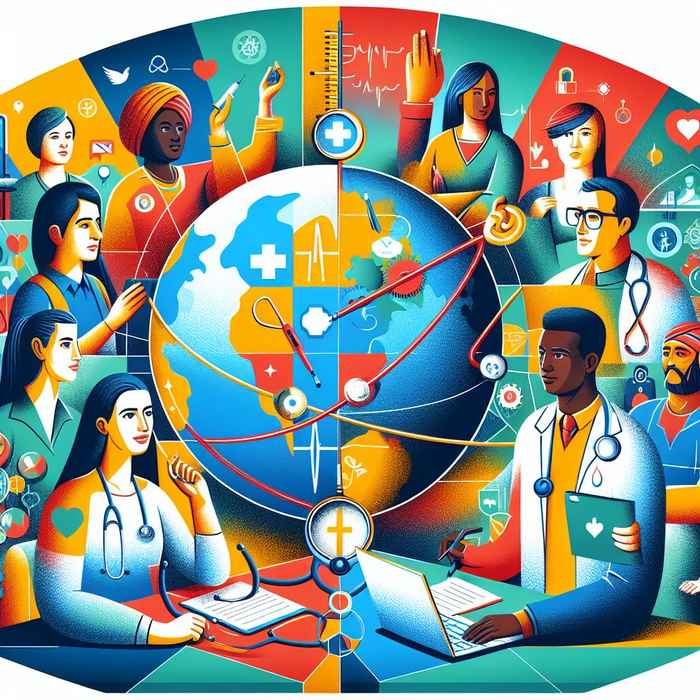Decolonizing Global Health: Insights from Roundtable Discussion
SSGH blog
29 October 2024

History of “Global Health”
Historians have shown how global health practices continue to be shaped by intellectual, institutional, and epistemological continuities with its predecessors, such as international health and colonial medicine. These historical legacies have created path dependencies that frustrate efforts to fully embrace a broad vision of global health and decolonize the field. The WHO adopted the term "global health" to reflect this broader vision, but from the outset, it faced structural limitations in fully realizing its ambitions.
The term “global health” emerged in response to a crisis within the World Health Organization (WHO), which revolved around a debate about how health should be approached. Some within the WHO advocated for a broad, long-term approach emphasizing social medicine, preventive care, and primary healthcare. Others favored short-term, vertical interventions focused on specific diseases, often with a technical or pharmaceutical emphasis, which were seen as more cost-effective. In response to these crises, the WHO redefined its role, intending to focus more on coordinating global health efforts rather than being the main driver of short term initiatives.
However a change in funding structure and the resulting necessity to prove the return of investment hampered the WHO’s intended “global” strategy. Traditionally, the WHO was funded by member states, but by the 1990s, it increasingly relied on extra-budgetary funding from sources like the World Bank and wealthy donors from the Global North. These donors started influencing the WHO's agenda, even though the Global South had the numerical majority in the World Health Assembly. This shift restricted the WHO’s ability to pursue long-term strategies, forcing it to focus on short-term, measurable interventions. The result was a decentralization of the WHO's role, with many external players becoming involved in global health efforts.
Social Sciences and “Global Health”
Incorporating social sciences into global health practices presents both significant benefits and notable challenges. On one hand, there is the danger of overly relying on "blunt instruments"—traditional research methods like knowledge surveys and rapid assessments. While these approaches can provide substantial data, they often lack a critical perspective, leading to superficial insights that overlook the complexities of culture and health-seeking behaviors. This can result in an oversimplified view of culture, framing it merely as an obstacle to health rather than recognizing it as a dynamic factor that influences health outcomes.
On the other hand, integrating more nuanced, context-sensitive methodologies can benefit health efforts. These methods focus on local narratives and lived experiences, allowing researchers to examine the underlying social factors of health and better understand the power dynamics that contribute to health disparities. For example, during the Ebola crisis medical anthropologists collaborated with organizations like Médecins Sans Frontières to create culturally sensitive communication strategies that encouraged people to seek medical help and follow safety guidelines. By focusing on the lived experiences of individuals and communities, anthropology contributed to more effective responses that respected local customs and improved health outcomes during the crisis. However, the challenge remains to decolonize and overcome entrenched practices and biases in global health that favor western knowledge.
Pitfalls of Decolonization Strategies
Decolonizing global health requires more than just addressing the legacy of colonialism; it demands a fundamental shift in how knowledge is understood and valued. While the Global South often sees decolonization as a return to pre-colonial cultural foundations or a challenge to the West, the Global North tends to approach it as a means of addressing historical guilt. The multiple meanings of “decolonization” creates a disconnect which can, especially when decolonization is conflated with concepts like equality, diversity, and inclusion, rob marginalized participants of the opportunity to be heard with their concerns.
One roundtable-discussant gave an example that emphasized that decolonization requires a deeper critical awareness of power dynamics and epistemological plurality; an attempt to decolonize a university's curriculum involved faculty engaging non-western students in co-designing the curriculum. While the faculty felt positive about this inclusive approach, some Asian students expressed discomfort, as they were unfamiliar with non-hierarchical interactions between students and teachers, which is uncommon in their educational systems. This exercise inadvertently made them feel vulnerable and disempowered. Hence, decolonization must go beyond simply inviting the marginalized to the master's house, true decolonization must embrace them ‘on their own terms’ and integrate them into global health practices.

The Tension between Theory and Practice
A widely shared concern at the roundtable was tensions between applied and theoretical work in anthropology. Theoretical engagement can be frustrating when it fails to contribute to real change, while applied work is often criticized for not being political and critical enough. Still, discussants were hopeful that academics can contribute to real change by entering the messiness of applied work. To do this, it remains essential to amplify marginalized voices and challenge the dominance of Western-centric narratives in global health. The need for Global South countries to articulate their own visions for development was emphasized as a crucial step toward decolonization, however the North also needs to facilitate this process and not leave the sole responsibility to those already facing structural disadvantages.
A recurring theme was the impact of financial and academic structures on global health initiatives. Participants noted that donor-driven agendas often dictate the direction of development, reinforcing existing power imbalances. Academic structures also often perpetuate colonial power dynamics, limiting the representation of diverse perspectives and especially marginalized voices. Critical questions were raised about whose concepts are validated in academic discourse and with which consequences. For instance, when scholars from the global south are confronted with the choice to, either join academic debates in the global north by citing the canon and adopting certain concepts, or not be published and lack funding opportunities.
Pathways Forward
As for today, whether global health is on its way out depends on how we define the term. If we refer to the decline of traditional institutions like the WHO and the rise of private sector influence in global health, then yes, it has been in decline for some time. But if we think of global health as the broad vision articulated in the 1990s—one that remains unfulfilled—then global health is still evolving, though it faces significant challenges that threaten to narrow its scope once again.
Participants see potential when academics dare to step down from their ivory tower into the complexities of the real world as many identified an access point for real change in collaborations between academics and practitioners. Still, academics need to be willing to learn from concerns within the field through ongoing dialogues that bridge the gap between theory and practice. Many expressed a renewed commitment to engage in deeper conversations about decolonization and to actively seek out opportunities for collaboration. The importance of recognizing all participants as practitioners in their own right was highlighted, emphasizing that everyone has a role to play in reshaping global health.
To achieve this, the idea of creating an "annex" to existing academic structures—independent but connected—was proposed. The SSGH aspires to be this new wing of the Master’s house, allowing for the inclusion of diverse narratives and methodologies without dismantling the entire system. We invite ideas, languages, and understandings that don’t need to be "othered," allowing marginalized voices to have conversation on their own terms, without forcing them to conform to the dominant canon of literature we feel obligated to cite, generation after generation. This vision calls for a transformation in medical education, where curricula should include perspectives such as gender and queer studies, while challenging the dominance of Western academic gatekeepers in research and publishing. Incorporating Southern knowledge systems is essential for developing health models that truly reflect the global nature of health challenges.